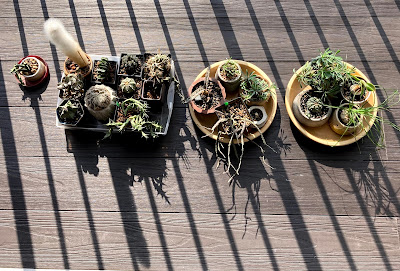 |
| [Nothing as romantic as willows, crabapples or chrysanthemums grow in my balcony. Last weekend, the fierce sun demanded that I give my trays of tiny but precious succulents a treat!] |
Earlier this year I remember watching YouTube videos with WW in her living room about Sung Dynasty poems (haha, that's what ex-lit students do when they hang out). The talkshow featured Taiwanese High School students sharing their favourite Sung Dynasty poems with a special guest. Not long after, another friend NB told me about a BBC series called "Chinese characters" - 10min podcasts on interesting figures throughout China's history - and one episode was on Sung Dynasty poet Li Qing Zhao (1084-1155).
Today I will share a poem from almost a thousand years ago.
Li Qing Zhao was an educated and admired woman who married a successful bureaucrat at age 18. They shared a love for books, calligraphy and other collectibles, and accordingly had a calligraphy collection that was supposed to be the envy of many. They were the 11/12th century equivalents of privileged, cultured liberals. Her early poems speak of wine, nature, love and longing. As the Sung Dynasty was thrust into war and turmoil, she was uprooted and her life also descended into a rather lonely and sad second half. This latter half was marked by poems that spoke not only of wine, nature, love (still) - but also exile, nostalgia, a kind of patriotism and certainly, grief and sorrow.
To appreciate their emotive expressiveness, you have to imagine that Sung Dynasty 词Ci as essentially lyric poems, often set to the popular tunes of that day, and written by scholars, courtesans, poets, lovers and friends, famous among them was Su Shi (also known as Su dongpo, yes the guy for whom the stewed pork dish was named!) These lyric poems were widely read and shared as one talked politics, drank wine, recited poetry, flirted and partied.
I came across these lively and enjoyable translations by Shanghainese Wang JiaoSheng, published online in a UPenn journal in 1989. They have the quality of song and speech. I share his translation of Li Qing Zhao's famous poem "Spring Ends" from I think the earlier half of her life that gives you a sense of her lyrical talent:
Spring Ends
(To the tune of "Dream Song")
Last night there was intermittent rain, a gusty wind.
Deep sleep did not relieve me of
The last effects of wine.
I ask the Maid rolling up the blinds,
But she replies, "The crab-apple is lovely as before."
"Don't you know?
"Oh, don't you know?
"The green should be plump and the red lean?"
In this short poem, the speaker of the poem rouses from sleep. But we gather while it was a deep sleep, she seemed to still be lost in something - the effects of the wine, wind and rain are perhaps symbolic of a turmoil within. To the maid, however, nothing has been disturbed: the crab-apple tree is as beautiful as the day before. But the speaker, perhaps still caught in her own lonely thoughts, asks "Don't you know, oh don't you know" (in Chinese the 2 words repeated are so simple but almost despairing 知否知否)that the crab-apple should probably not be as before - the red flowers or fruits themselves should have either wilted or fallen after the night's storm, leaving more green, which in this case still speaks of life, but stripped perhaps of its highlights and vivacity.
The context or meaning is ambiguous. The footnote by Wang JiaoSheng says that the final line on green/red has continued to baffled scholars. But sung or recited to the tune "A Dream Song", perhaps this lyric expresses a certain ambiguous but deep loss - one you cannot name for fear of its name - and as if waking from a dream to a reality that is what it is.
Comments